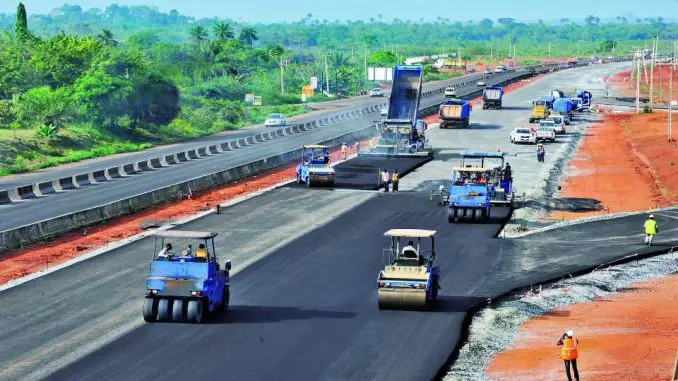The Nigerian House of Representatives (NHR) has ordered construction giant, Julius Berger, to resume work on the Abuja-Kaduna road project. The lower legislative chamber adopted a motion put up by Garba Datti and under Speaker Femi Gbajabiamila’s direction. The motion urged the company to see that the Jere-Kaduna road segment was completed.
In order to ensure that the resolutions are implemented, the Green Chamber instructed its Committee on Works. The instruction was to communicate with the Minister of Works and Housing and the chiefs of security agencies. The Committee was instructed to report back after three weeks.
Also Read: Greeter Abuja water project in Nigeria endangered in terms of execution and delivery
The Abuja-Kaduna road project is expected to be completed by December
Additionally, Datti (APC: Kaduna) noted that the inconvenience caused to drivers by the delay in finishing the roads was immense. He noted that in March 2021, Babatunde Fashola (SAN), the minister of works and housing, revealed that the Federal Executive Council had authorized, among other approvals, a contract for the repair of the Abuja-Kaduna road, with a delivery date of December 2022.
He said, “Remember when the honorable minister indicated that Julius Berger Plc, would also be in charge of the reconstruction? The contractor withdrew its employees in response to the frequent and widespread episodes of banditry on the Abuja-Kaduna road. Notes that at least one-half of the stretch of road was graded and covered only in laterite at the time.”
“However, after the recent intense rainstorms, the laterite gave way to gorges and potholes that rendered the highway impassable. It has also caused traffic to move at a significantly slower rate. As a result, a trip that would have taken one and a half hours to complete now takes three hours. Note also that the current state of the road means that it only takes one car or truck to break down for a short period of time to create a static traffic situation,” he continued.
Reported earlier
Jan 2021
Reconstruction of Abuja-Kaduna-Kano road, Nigeria, to be completed in 2023
The Abuja-Kaduna-Kano road project is making headway and it is expected to be delivered in 2023 according to Eng. Funso Adebiyi, the Director of Highways Construction and Rehabilitation (FMWH) in the Federal Ministry of Works and Housing.
Adebiyi made the revelation in a statement following a visit to the project site to assess the progress of the ongoing reconstruction works.
“Work is going on simultaneously on all sections of both lanes of the 375 kilometers dual carriage road from Abuja-Kaduna- Kano. We are pleased with the quality of work and we intend to increase its pace,” read the statement.
Work done so far
On the level of work done so far, the FMWH Director said that a lot of progress has been made.
Also Read: US$ 29m for road and market projects in Yobe State, Nigeria
“Over 100 kilometers, although not at a stretch, have been completed under sections one to three i.e. Abuja-Kano. Also, 40 kilometers has been completed under section two which is Kaduna-Zaria, and 70 kilometers completed under section three from Zaria-Kano,” he explained.
He also stated that while some sections of the road were also at different levels of completion, remedial works were being carried out on the sections that were critically bad in order to facilitate movement.
The Abuja-Kaduna-Zaria-Kano Road forms a critical part of the West African country road network, enabling the movement of people and products from the North to the South and vice versa – thereby uniting the Nigerian people and economy, and connecting Nigeria to North Africa via the Lagos-Algiers Trans-African Highway.
The contractor
The Abuja-Kaduna-Zaria-Kano road reconstruction project was awarded to Julius Berger Nigeria Plc, a leading Nigerian company offering integrated construction solutions and related services, on December 20, 2017.
The project commenced on May 21, the following year with 36 months completion period.
Abuja-Kaduna-Kano Road: Kaduna-Zaria sections I and II to be completed in 2022
Sections II and III of the Kaduna-Zaria Road in Nigeria will be completed by the end of 2022. The road is a part of the ongoing reconstruction of the Abuja-Kaduna-Kano road. The latter on the other hand forms a critical part of the West African country road network.
The revelation was made by Mr. Folorunsho Esan, in Kaduna during a two-day tour to inspect the project. Esan is the Director of Highway Construction and Rehabilitation at the Federal Ministry of Works and Housing.
Section II of the Kaduna-Zaria road is 146 kilometers long, while section III is 14 kilometers long and connects to the Kaduna-Abuja section. Esan believes the work on the entire Kaduna-Zaria road could as well be completed within the year. This he said is mainly based on the contractor’s previous work performance.
Furthermore, the director added that the only project left on the Abuja-Kaduna-Kano road after this year’s delivery of sections two and three of the Kaduna-Zaria road is the Abuja-Kaduna road.
Commitment to completing the Kaduna-Zaria road project on time
“Every issue brought to the ministry’s attention has been resolved on potential obstacles the contractor might face, ” said Esan. He in addition affirmed that “nothing would prevent the work on Kaduna-Zaria road from progressing forward.”
“The Kaduna-Zaria road will be completed six months earlier than expected,” said Mr. Theo Scheepers. Scheepers is the Project Manager for Julius Berger Nigeria Plc, a Nigerian construction company, headquartered in Abuja
“Issues that would have presented obstacles to the project have been handled. This is thanks to the help of the ministry and the cooperation of stakeholders like local government chairmen and community leaders,” confirmed Scheepers.
He further explained that they were working closely with the ministry to tackle these issues on a weekly basis. Scheepers claimed that they encounter new difficulties each time they visit a new zone. He however reckoned that they have excellent cooperation, with participation from local government, local leaders, and all the stakeholders.

